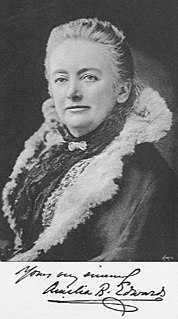A Quote by John Milton
Of man's first disobedience, and the fruit/Of that forbidden tree, whose mortal taste/Brought death into the world, and all our woe,/With loss of Eden, till one greater Man/Restore us, and regain the blissful seat,/Sing heavenly muse
Related Quotes
... when death has been brought upon a saint, we ought not to think that an evil has happened to him but a thing indifferent; which is an evil to a wicked man, while to the good it is rest and freedom from evils. 'For death is rest to a man whose way is hidden' (Job 3:23 LXX). And so a good man does not suffer any loss from it.
So where does the name Adam's apple come from? Most people say that it is from the notion that this bump was caused by the forbidden fruit getting stuck in the throat of Adam in the Garden of Eden. There is a problem with this theory because some Hebrew scholars believe that the forbidden fruit was the pomegranate. The Koran claims that the forbidden fruit was a banana. So take your pick---Adam's apple, Adam's pomegranate, Adam's banana. Eve clearly chewed before swallowing.
We are the spirit children of a Heavenly Father. He loved us and He taught us before we were born into this world. He told us that He wished to give us all that He had. To qualify for that gift we had to receive mortal bodies and be tested. Because of those mortal bodies, we would face pain, sickness, and death.
The Bible is the story of two gardens: Eden and Gethsemane. In the first, Adam took a fall. In the second, Jesus took a stand. In the first, God sought Adam. In the second, Jesus sought God. In Eden, Adam hid from God. In Gethsemane, Jesus emerged from the tomb. In Eden, Satan led Adam to a tree that led to his death. From Gethsemane, Jesus went to a tree that led to our life.
Do you, good people, believe that Adam and Eve were created in the Garden of Eden and that they were forbidden to eat from the tree of knowledge? I do. The church has always been afraid of that tree. It still is afraid of knowledge. Some of you say religion makes people happy. So does laughing gas. So does whiskey. I believe in the brain of man.
The sun hides not the ocean, which is the dark side of this earth, and which is two thirds of this earth. So, therefore, that mortal man who hath more of joy than sorrow in him, that mortal man cannot be true-- not true, or undeveloped. With books the same. The truest of all men was the Man of Sorrows, and the truest of all books is Solomon’s, and Ecclesiastes is the fine hammered steel of woe.
Near our vineyard there was a pear tree laden with fruit that was not attractive in either flavor or form. One night, when I [at the age of sixteen] had played until dark on the sandlot with some other juvenile delinquents, we went to shake that tree and carry off its fruit. From it we carried off huge loads, not to feast on, but to throw to the pigs, although we did eat a few ourselves. We did it just because it was forbidden.






































